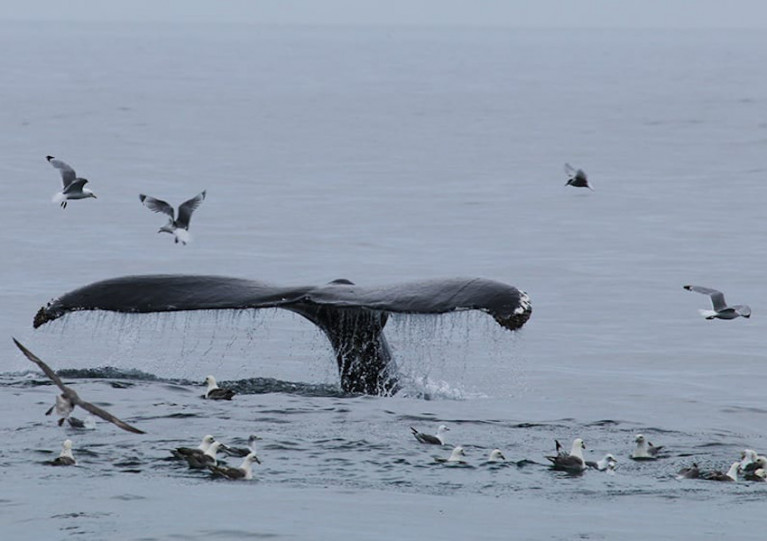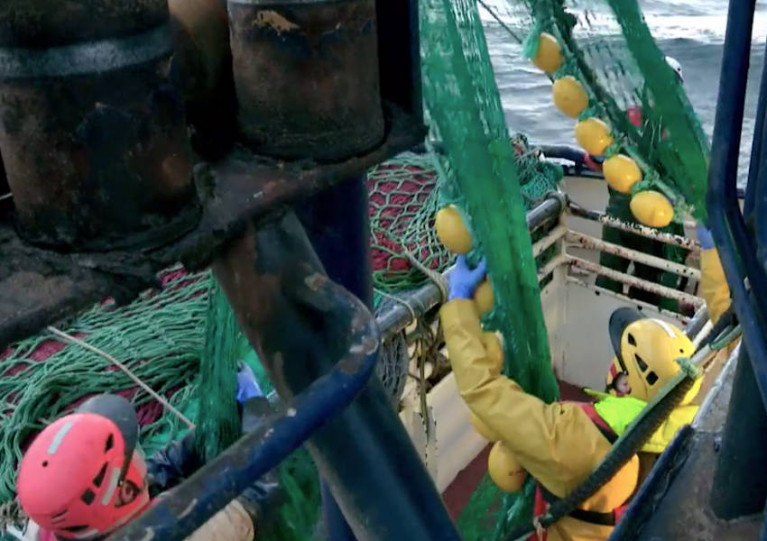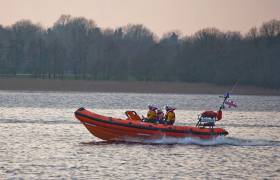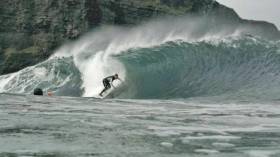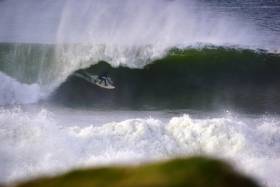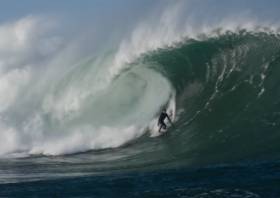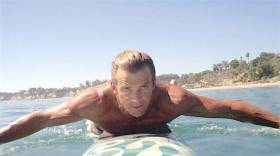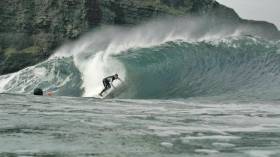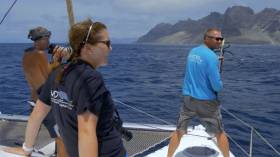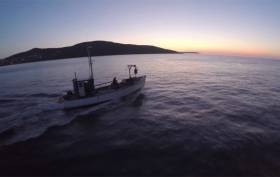Displaying items by tag: documentary
Documentary On Irish Mission To Find Humpback Whales In Arctic Circle Now Streaming Online
A new hour-long documentary following the Irish Whale and Dolphin Group (IWDG) on a unique research expedition to the Arctic Circle is now available to rent and watch on demand.
On The Trail Of The Humpback Whale tells the story of the IWDG’s weeks-long passage to Iceland two years ago in search of humpback whales, building links with the country and its people among the way.
Tony Whelan of Canola Pictures — which also produced The Humpback Whales of Cape Verde — was along for the voyage, documenting the team’s encounters with local people and marine wildlife alike.
The IWDG previously brought the story of their adventure on a nationwide tour — and now it can be enjoyed at home on your choice of computer, tablet, smartphone or streaming box.
Trawler Caught Fire And Sank During Filming For Documentary On Challenges Faced By Fishing Communities
The owner of a fishing trawler that took part in a new TG4 documentary series has revealed that the vessel caught fire and sinking during filming.
According to the Irish Examiner, the Susanne II was one of several vessels being followed by camera crews over a number of months for ‘Gafa sna Líonta’, the first episode in the new series of Tabú which starts next Wednesday 8 January at 9.30pm.
‘Gafa sna Líonta’ chronicles the stories of fishermen around Ireland’s coastal and the various challenges facing our coastal communities.
Cameras were not present at the time of the incident, however, in which the trawler’s three crew were airlifted to safety some 100km off the east coast.
Boat owner Ronan Forde explained how he feared for his men’s lives when he learned of their predicament at sea. The Irish Examiner has more on the story HERE.
Lough Ree Lifeboat Volunteers Feature In Latest Series Of BBC’s ‘Saving Lives At Sea’
Lough Ree RNLI’s lifeboat volunteers will be showcased on the small screen in an upcoming episode of BBC TV series Saving Lives at Sea.
Tune in to BBC Two on Tuesday 15 October at 8pm to see the Lough Ree crew on two callouts, firstly when they launch to the aid of two fishermen whose boat is swamped during a fishing competition.
Next they’re tasked come to the aid of an elderly man taken ill on the island of Inch Bofin — alongside rescue stories from their colleagues at other stations and beaches around Ireland and Britain’s coasts and inland waters.
Lough Ree’s appearance follows last year’s profile of Courtown’s lifesavers, as previously reported on Afloat.ie.
Lough Ree RNLI helm Tom Bradbury says: “It’s great to see the work we do on TV like this.
“We’re always grateful for the support we get from the public as we rely on donations to do what we do, so it great that all our supporters now get to see, from the comfort and safety of their own front rooms, exactly how they help us save lives.”
Filming for the fourth series of Saving Lives at Sea took place over the past year, with lifeboat crews and lifeguards carrying special cameras and welcoming film-makers into their day-to-day life.
Rescues from the RNLI’s archives are also revisited, and viewers can get a glimpse into the everyday lives of the thousands of men and women who give up their time to save lives.
Viewers in the UK can also watch the series on demand following broadcast on the BBC iPlayer.
Surfing documentary Between Land and Sea will have its Irish TV premiere tonight (Tuesday 20 August) at 10.15pm on RTÉ 2.
Ross Whitaker’s film chronicles ‘a year in the life of an Atlantic surf town’, namely Lahinch in Co Clare — capturing the character of a coastal spot that experiences some of Ireland’s most spectacular waves, as previously noted on Afloat.ie.
Among its subjects is Fergal Smith, a former big wave pro surfer who switched to the more sedate world of organic farming — working at the literal grassroots with the local community.
Whitaker — who since directed the acclaimed boxing documentary Katie — toured Ireland with screenings to much applause two years ago, and now the whole nation will have an opportunity to see on TV after the UEFA Champions League match, and online via the RTÉ Player.
Update Wednesday 21 August: The film is now streaming on demand at RTÉ Player until 20 September 2019.
#Surfing - The first part of Made in Ireland, Mikey Corker’s new documentary on Irish surfing’s past and present, is now streaming on the Red Bull website.
The film had its premiere in Bundoran last month, and now the whole world can watch ‘The Torchbearers’ which profiles some of the game-changing characters in the Irish surfing scene.
Barry Britton — father of Easkey Britton, a pioneer in her own right — was one of the ‘beach bums’ who along with his brothers built the foundation of Ireland’s surfing community from his family’s hotel in Rossnowlagh in the 1960s.
Nowadays an accomplished designer, Barry is still riding the waves in his sixties, though he leaves the heavy stuff to the new crop of talent like Conor Maguire who have put Ireland on the map as a big wave surfing destination.
Seamus ‘Shambles’ McGoldrick tells how Mickey Smith set a new standard for surfing swells once thought unconquerable in the mid 2000s, inspiring peers Tom Lowe and Fergal Smith to raise the bar — and even make surfing a viable career, until a deep connection with the environment called for a different path.
Irish Surfing Documentary Premieres In Bundoran This Saturday
#Surfing - If you’re in Bundoran this Saturday (22 September), you may be able to catch the world premiere of a new documentary on the legacy of Irish surfing.
Made In Ireland will screen at The Chasin’ Bull at 6pm and admission is free, but spaces are limited so seats must be reserved via Red Bull.
Mikey Corker’s film follows local big wave surfer Conor Maguire as he rides Ireland’s most renowned swells and meets the characters that help make this country’s surfing scene so sought-after.
Big Waves Hit The Big Screen With Surfing Docs At Dublin’s IFI
#Surfing - Surf’s up at the Irish Film Institute in Dublin with Mavericks, a weekend of three exceptional surfing documentaries this coming Saturday 2 and Sunday 3 December.
The IFI has selected three of the top surf films released last year to screen in a season named after the famous surfing spot in Half Moon Bay, California.
The selection includes the Irish première of Rory Kennedy’s Take Every Wave: The Life of Laird Hamilton.
This documentary charts Hamilton’s unconventional career, from his early days in Hawaii where surfing became a refuge from an abusive home to international recognition and celebrity.
Following a triumphant screening at the Dublin Arabic Film Festival in October, Gaza Surf Club will once again return to the big screen.
The resilience of Gaza’s population is revealed through this documentary, which focuses on the world of 15-year-old Sabah, who learned the sport as a girl but is now no longer allowed to practice in public.
On Sunday, director Ross Whitaker will participate in a Q&A following an encore screening of Between Land and Sea.
One of the biggest Irish films at the IFI this year, Between Land and Sea embeds itself in a community of surfers in Lahinch, Co Clare over the course of a sea-buffeted year and is described as an immersive portrait of a people and a place.
Tickets for these screenings are available now from IFI.ie or by calling the IFI Box Office on 01 679 3477.
New Documentary Charts Lahinch’s Surfing Culture
#Surfing - Between Land and Sea is a new documentary on the surfing culture of Lahinch that’s currently touring with screenings around Ireland, as TheJournal.ie reports.
Chronicling ‘a year in the life of an Atlantic surf town’, Ross Whitaker’s film set out to capture the characters of the Co Clare coastal spot that’s become a gateway to some of Ireland’s most spectacular waves.
Big wave surfing isn’t just a sport for its top names — it’s a lifestyle. And the film gets to know a number of those who have made it their life’s work to get in harmony with their environment.
Among them are Ollie O’Flaherty, a regular at the Riley’s break at Lahinch as well as Aileen’s under the Cliffs of Moher, and Fergal Smith, the subject of two other recent films on the organic farming collective he’s helped establish for himself and fellow wave chasers.
Smith also features in Common Ground, a new film from Finisterre in which the surf clothing brand’s ambassadors — including women’s surfing pioneer Easkey Britton — met to share their challenges and achievements thanks to the power of the waves, as Huck reports.
Another recent surfing video from Red Bull shows what happened when Barry Mottershead invited American surfers Cody Thompson, Justin Quintal and Nate Zoller to taste the waves of the Wild Atlantic Way.
Cape Verde Humpback Whales Doc On TG4 This Weekend
#MarineWildlife - Irish-made documentary The Humpback Whales of Cape Verde will be broadcast this Saturday 29 October at 7.15pm on TG4.
Narrated by Liam Ó Maonlaí and shot in Cape Verde, Ireland and Malta, the film follows Dr Simon Berrow of the the Irish Whale and Dolphin Group (IWDG) and an international team of marine scientists on an ambitious adventure to prove humpback whales from both the northern and southern hemispheres use the Cape Verde archipelago as a breeding ground.
“If we could make the connection, our understanding of humpback whale behaviour in the Atlantic would change,” says Dr Berrow. “Such a breeding ground would be unique. But going there in the first place at that time of year and at significant cost was a big if in itself.”
The lecturer at GMIT also believes the film will help highlight the importance of conservation in Irish waters.
“It still comes as a surprise to many that we have whales in Ireland,” he says. “In fact the numbers here are increasing each year and Ireland is becoming internationally important.
“To understand where whales in Ireland are coming from or going to and breeding is essential to protect them. This film is part of a 12-year search for the breeding grounds of humpback whales in Ireland.”
The broadcast on TG4 this weekend coincides with the 25th anniversary of all Irish waters being declared a whale and dolphin sanctuary, the first of its kind in Europe.
“It is an international story with an Irish perspective,” says director Tony Whelan. “It’s a cracking tale. Spending time with these scientists in an extraordinary environment was a privilege. We hope people enjoy it.
“We are really happy it has been taken up by TG4, an important channel for independent filmmakers. Without them stories like this can go unseen.”
The Humpback Whales of Cape Verde was screened around the country earlier this year as part of a library tour, as previously reported on Afloat.ie.
'Atlantic' Director Talks Impact Of Economic & Ecological Change On Coastal Communities
#Documentary - "It’s about understanding the ocean, working with the ocean. Not just seeing it as something to grab, but as something you look after."
That's the message of new documentary Atlantic by Irish filmmaker Risteard Ó Domhnaill, who spoke to Ian Maleney for The Irish Times on its release in Irish cinemas yesterday (Friday 29 April).
As previously reported on Afloat.ie, the feature-length documentary – narrated by Emmy Award-winner Brendan Gleeson – follows the fortunes of three small Atlantic coastal fishing communities in Ireland, Canada and Norway.
Each facing their own challenges, from the impact of oil exploration and climate change to the pressures of large-scale commercial fishing.
And as Ó Domhnaill relates from his experience making the film, these livelihoods have changed dramatically even in only the last five years.
"Who knows what’s going to happen, what’s going to hit the ocean?" he says of the years ahead. "Acidification, warming of currents? We’re facing a crossroads. We can’t just fence off our part of the sea and say ‘We’ll look after that’. It’s a much bigger challenge."
The Irish Times has much more on the story HERE.



























